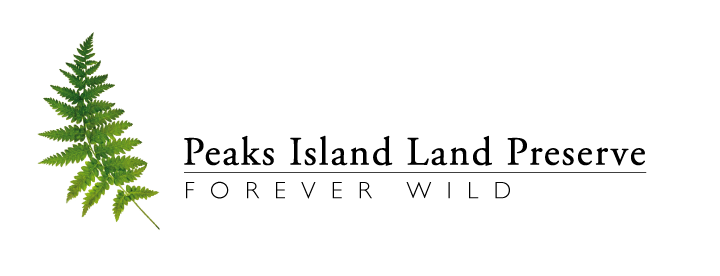This Blog is in Memory of a rare Black Vulture in Maine

In late June, sitting on the ground under the trees, a vulture was found in the middle of the Island on Indian Trail. The bird was easily approached which is not a good sign, plus it is unusual to find a vulture on the ground, not at a carcass, and under a thick forest canopy. On closer inspection, after observing the bird for three days with no change in location or behavior, a lesion was seen around the left eye that could be either an injury or a sinus infection (1). The bird was then identified as a Black Vulture.

Peaks Island's Black Vulture
A call was made to our closest bird rehabilitation center, Avian Haven, and Diana, the manager of the center, was quick to rally a volunteer to pick up the bird from the ferry in Portland the following morning, but doubted that it was actually a Black Vulture as they are uncommon to rare this far north (Turkey Vultures are much more common in Maine). Unfortunately, the bird did not survive the night after being picked up and housed in a large dog crate in preparation for a morning ferry run to Portland. Pictures were taken, measurements were made, and the data were emailed to Avian Haven to preserve the record of its occurrence on Peaks Island.
After looking at the pictures, Diana positively identified the bird as a Black Vulture and reported its location to the Maine Birds Records Committee because of the rarity of seeing this species in Maine.
Without a thorough inspection by a veterinarian, we will probably never know what that lesion was and why this Black Vulture died. We want to let Islanders know that this Black Vulture found his/her way to our Island. We also want his/her presence formally recorded, so that it is not forgotten. We may be seeing more Black Vultures flying in mixed groups with our summer Turkey Vulture visitors in the future, so keep reading to learn more about these new migrants to Maine, their interesting natural history, and how to tell them apart from Turkey Vultures. Please find this information on PILP’s Bird Varieties Page: Vulture.
We also add the fascinating fact that Black Vultures, along with other bird species, have been expanding their range northward over the last 35 years in response to changing climate conditions. Please read the below links on this subject:
1. For information on this northward range expansion, visit the Audubon website on Black Vultures at: http://www.audubon.org/field-guide/bird/black-vulture
2. An interesting article on the subject can also be located on the Phys.org website at: https://phys.org/news/2012-03-bird-ranges-shift-north-fast.html
Vultures, being spectacular birds, were once revered as important symbols of burial rituals and the release of the human spirit (2). The Black Vulture mentioned above was placed on a rock in the middle of the island - in an area not visited regularly by people and dogs - offering this bird, as food to other scavengers, which we believe, he or she, being a vulture, would appreciate.
References:
1. Michael LaCombe
2. Del Hoyo, J., A. Elliot, J. Sargatal (eds). 1994. Handbook of Birds of the World. Vol. 2. New World Vultures to Guineafowl. Ppg. 24-41. Lynx Edicions, Barcelona.
By: Michelle Brown
Photos: Michelle Brown and Sam Wainright
Reviewed by: Patty Wainright
Our sincere gratitude to: Diane at Avian Haven; 418 N Palermo Rd, Freedom, ME 04941. 207 382 6761. avianhaven.org


















